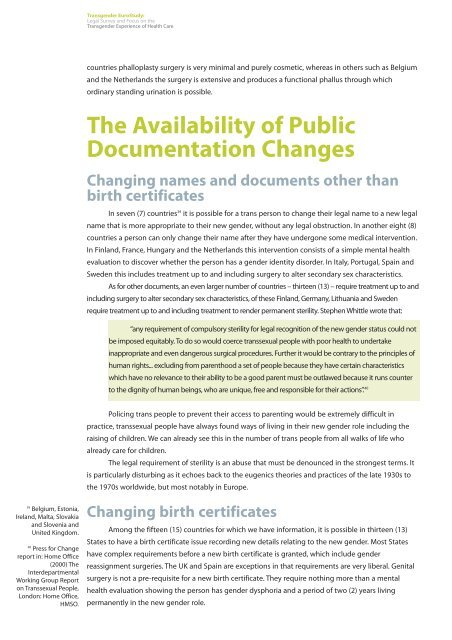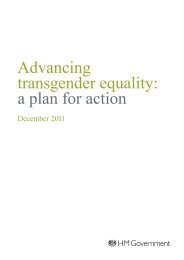Transgender EuroStudy â Legal Survey and Focus ... - ILGA Europe
Transgender EuroStudy â Legal Survey and Focus ... - ILGA Europe
Transgender EuroStudy â Legal Survey and Focus ... - ILGA Europe
You also want an ePaper? Increase the reach of your titles
YUMPU automatically turns print PDFs into web optimized ePapers that Google loves.
<strong>Transgender</strong> <strong>EuroStudy</strong>:<br />
<strong>Legal</strong> <strong>Survey</strong> <strong>and</strong> <strong>Focus</strong> on the<br />
<strong>Transgender</strong> Experience of Health Care<br />
countries phalloplasty surgery is very minimal <strong>and</strong> purely cosmetic, whereas in others such as Belgium<br />
<strong>and</strong> the Netherl<strong>and</strong>s the surgery is extensive <strong>and</strong> produces a functional phallus through which<br />
ordinary st<strong>and</strong>ing urination is possible.<br />
The Availability of Public<br />
Documentation Changes<br />
Changing names <strong>and</strong> documents other than<br />
birth certificates<br />
In seven (7) countries 39 it is possible for a trans person to change their legal name to a new legal<br />
name that is more appropriate to their new gender, without any legal obstruction. In another eight (8)<br />
countries a person can only change their name after they have undergone some medical intervention.<br />
In Finl<strong>and</strong>, France, Hungary <strong>and</strong> the Netherl<strong>and</strong>s this intervention consists of a simple mental health<br />
evaluation to discover whether the person has a gender identity disorder. In Italy, Portugal, Spain <strong>and</strong><br />
Sweden this includes treatment up to <strong>and</strong> including surgery to alter secondary sex characteristics.<br />
As for other documents, an even larger number of countries – thirteen (13) – require treatment up to <strong>and</strong><br />
including surgery to alter secondary sex characteristics, of these Finl<strong>and</strong>, Germany, Lithuania <strong>and</strong> Sweden<br />
require treatment up to <strong>and</strong> including treatment to render permanent sterility. Stephen Whittle wrote that:<br />
“any requirement of compulsory sterility for legal recognition of the new gender status could not<br />
be imposed equitably. To do so would coerce transsexual people with poor health to undertake<br />
inappropriate <strong>and</strong> even dangerous surgical procedures. Further it would be contrary to the principles of<br />
human rights... excluding from parenthood a set of people because they have certain characteristics<br />
which have no relevance to their ability to be a good parent must be outlawed because it runs counter<br />
to the dignity of human beings, who are unique, free <strong>and</strong> responsible for their actions”. 40<br />
Policing trans people to prevent their access to parenting would be extremely difficult in<br />
practice, transsexual people have always found ways of living in their new gender role including the<br />
raising of children. We can already see this in the number of trans people from all walks of life who<br />
already care for children.<br />
The legal requirement of sterility is an abuse that must be denounced in the strongest terms. It<br />
is particularly disturbing as it echoes back to the eugenics theories <strong>and</strong> practices of the late 1930s to<br />
the 1970s worldwide, but most notably in <strong>Europe</strong>.<br />
39<br />
Belgium, Estonia,<br />
Irel<strong>and</strong>, Malta, Slovakia<br />
<strong>and</strong> Slovenia <strong>and</strong><br />
United Kingdom.<br />
40<br />
Press for Change<br />
report in: Home Office<br />
(2000) The<br />
Interdepartmental<br />
Working Group Report<br />
on Transsexual People,<br />
London: Home Office,<br />
HMSO.<br />
Changing birth certificates<br />
Among the fifteen (15) countries for which we have information, it is possible in thirteen (13)<br />
States to have a birth certificate issue recording new details relating to the new gender. Most States<br />
have complex requirements before a new birth certificate is granted, which include gender<br />
reassignment surgeries. The UK <strong>and</strong> Spain are exceptions in that requirements are very liberal. Genital<br />
surgery is not a pre-requisite for a new birth certificate. They require nothing more than a mental<br />
health evaluation showing the person has gender dysphoria <strong>and</strong> a period of two (2) years living<br />
permanently in the new gender role.








